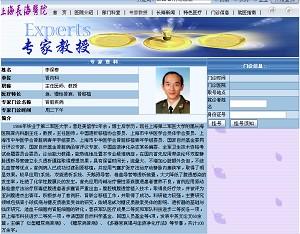On May 4, The Yangtze Evening News reported that China’s most famous kidney expert, Dr. Li Baochun, had committed suicide by jumping from the twelfth floor of the Shanghai No. 2 Military Medical University Shanghai Hospital Building. Dr. Li had served as Deputy Director of the hospital and as Professor and Chief Physician for kidney disease. The report said Dr. Li’s suicide was caused by depression.
On May 24, The Yangtze Evening News report was reproduced on several major websites including the website of China’s most important official media, www.xinhua.net. Further analysis revealed that the cause of Dr. Li’s depression and subsequent suicide was connected to his organ transplant work. Xinhua.net deleted the report almost immediately.
Hospitalized for Depression Prior to Committing Suicide
The Yangtze Evening News reported that an undisclosed source from inside the hospital had informed them of Dr. Li’s depression and hospitalization.
The source told The Yangtze Evening News that during the months of March and April 2007, Dr. Li was often unable to sleep. Dr. Li had begun to take sleeping pills but their effectiveness lasted only a very short time. He fainted once, but a physical exam could not offer an explanation. By May 1, Dr. Li’s depression was getting more and more serious. He was admitted to the hospital’s neurology ward and started taking antidepressant drugs.
The source also revealed that on the day Dr. Li committed suicide, he had visited the seventh floor of Shanghai Hospital where he had served as Director of the Kidney Department of Medicine. The twelfth floor houses the Urological Surgery Department which was a source for fresh kidneys for Dr. Li’s transplant work. A nurse told The Yangtze Evening News, that when a patient needs a kidney transplant, the transplant team will go to the Urological Team and request a healthy kidney.
Committed Suicide While At The Peak Of His Career
The Shanghai Hospital website bio on Dr. Li notes that he graduated from No.2 Military Medical University in 1986. He traveled to the United States for two years of further study toward a postdoctoral degree.
Dr. Li was Shanghai No.2 Military Medical University Subsidiary Shanghai Hospital Deputy Director, Professor and Chief Physician of Kidney Department of Medicine, a member of China Dialysis and Transplantation Association, Shanghai Chinese Medical Association, Shanghai Chinese Medical Association Study of Kidney Disease Youth Group, and the Shanghai Chinese Medical Association Study of Kidney Transplant Youth Group.
He was also an expert for the State Nature Fund Association, State Nature Fund Association Kidney Disease Analysis, an executive member of the editorial board of China Blood Purification magazine and a member of Military Health Technology Qualification Test Committee.
Many of the people working at Shanghai Hospital believed that Dr. Li had a wonderful life. He had everything including an excellent professional reputation, benefits, social position, car, house, kids and a wonderful future. Dr. Li’s co-workers also said that he was at the top of his career. Dr. Li was only 44 years old.
The Hospital Refuses to Comment
The locals are talking about Dr. Li’s suicide. “Everyone knows that a doctor from the Shanghai Hospital jumped out of the building,” said a resident from a nearby housing complex. The Shanghai Hospital, however, is not talking about Dr. Li’s suicide.
On May 14, the Director’s office and the doors leading to the ward of the Kidney Department of Medicine on the seventh floor of the Shanghai Hospital were locked. A middle-aged female doctor from a nearby doctor’s office appeared quite sensitive to the mention of “Dr. Li Baochu.” She shut the door immediately upon learning that the questioner was a reporter.
The Transplant Doctor’s Depression
Li’s depression before his death appeared similar to the condition Annie (assumed name) had described as experienced by her ex-husband, the former Chief Surgeon at Sujiatun Hospital. Annie used to work at the Sujiatun Hospital. Annie has previously exposed the illegal harvesting of healthy organs from living Falun Gong practitioners at the Sujiatun Hospital. Her ex-husband was first transferred there in 2001. During the two years that he had worked as chief surgeon, her husband had often performed several cornea extractions each day without the consent of the still living donors.
In March 2006, Annie revealed that beginning in 2003, her ex-husband had begun to be more withdrawn. He would watch TV while holding a sofa pillow, but failed to notice when the TV was turned off. Later he began to have nightmares and to sweat profusely during sleep. After close questioning, her ex-husband had revealed to her the dark secrets of his involvement in the harvesting of healthy organs from living Falun Gong practitioners during his two years at Sujiatun Hospital.
According to Annie, because of a guilty conscience, her ex-husband had suffered from depression for a long period of time, even after he fled and had stopped performing organ extractions from living, non-consenting donors. He was extremely nervous even when driving. His life was eventually destroyed by his feelings of guilt.
Annie knew of another doctor who had worked on organ transplants from living non-consenting donors. Like her ex-husband, this doctor also fell into depression after conducting such illegal surgeries over a long period of time.
Organ Harvesting From Living Falun Gong Practitioners Shocks the World
The exposure of the Chinese Communist Party’s (CCP) brutal killing of Falun Gong practitioners for profit in Mainland China through the harvesting of their healthy organs for transplant has shocked the international community.
In July 2006, two respected Canadian investigators announced to the world media that their investigations had confirmed that the CCP was involved in large-scale organ harvesting from living Falun Gong practitioners. The report confirmed the existence of such practices and that the practices continue in China today.
In January 2007, the Canadian investigators published a Revised Report into Allegations of Organ Harvesting of Falun Gong Practitioners in China. The latest report provided additional evidence that delineated the involvement of the Chinese army and military hospitals in the organ harvesting process.
The Shanghai Hospital is affiliated with the No. 2 Military Medical University in Shanghai. It is a Level Three Grade A hospital in the military system. On the hospital’s website the Urological Department states that the waiting time for a kidney transplant is short and the success rate is high.




Friends Read Free